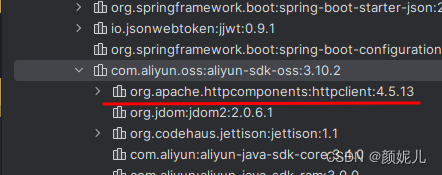HttpClient基础
发布时间:2023年12月26日
简介: HttpClient是Apache的一个子项目,可以提供高效的、功能丰富的支持HTTP协议的客户端编程工具包,并且它支持HTTP协议最新的版本和建议。
作用:
- 发送HTTP请求
- 接收响应数据

使用
导入maven坐标:
<dependency>
<groupId>org.apache.httpcomponents</groupId>
<artifactId>httpclient</artifactId>
<version>4.5.13</version>
</dependency>
核心API:
- HttpClient:使用它发送http请求;
- HttpClients:它相当于一个构建器,用它可以创建HttpClient对象;
- CloseableHttpClient:它是一个实现类,该实现类实现了HttpClient接口;
- HttpGet:代表http的Get请求方式;
- HttpPost:代表http的Post的请求方式;
发送请求的步骤:
- 创建HttpClient对象
- 创建Http请求对象(例如HttpGet,HttpPost等)
- 调用HttpClient的execute方法发送请求
测试
导入maven坐标,如果项目中已经导入aliyun-oss依赖,那么可以不用导入了,因为aliyun-oss依赖于httpcomponents,通过依赖传递,httpcomponents已经被导入到项目中了,如图所示:

显示导入:
<dependency>
<groupId>org.apache.httpcomponents</groupId>
<artifactId>httpclient</artifactId>
<version>4.5.13</version>
</dependency>
测试:
Get请求测试:
/**
* 测试 通过HttpCLient发送Get方式的请求
*/
@Test
public void TestGet() throws Exception{
//创建HttpClient对象
CloseableHttpClient httpClient = HttpClients.createDefault();
// 创建请求对象
HttpGet httpGet = new HttpGet("http://localhost:8080/user/shop/status");
//发送请求
CloseableHttpResponse response = httpClient.execute(httpGet);
//获取服务端返回的状态码
int statusCode = response.getStatusLine().getStatusCode();
System.out.println("服务端返回的状态码为:"+statusCode);
//解析返回结果
HttpEntity entity = response.getEntity();
String body = EntityUtils.toString(entity);
System.out.println("服务端返回的数据为:"+ body);
// 关闭资源
response.close();
httpClient.close();
}
输出:
服务端返回的状态码为:200
服务端返回的数据为:{"code":1,"msg":null,"data":1}
Post请求测试:
/**
* 测试 通过HttpCLient发送Post方式的请求
*/
@Test
public void TestPost() throws Exception{
//创建HttpClient对象
CloseableHttpClient httpClient = HttpClients.createDefault();
// 创建请求对象
HttpPost httpPost = new HttpPost("http://localhost:8080/admin/employee/login");
// 设置Post请求体
//StringEntity entity = new StringEntity("{username:'',password:''}");
JSONObject jsonObject = new JSONObject();
jsonObject.put("username","aaa");
jsonObject.put("password","bbb");
StringEntity entity = new StringEntity(jsonObject.toString());
// 指定请求编码方式
entity.setContentEncoding("utf-8");
// 设置数据格式
entity.setContentType("application/json");
httpPost.setEntity(entity);
//发送请求
CloseableHttpResponse response = httpClient.execute(httpPost);
//获取服务端返回的状态码
int statusCode = response.getStatusLine().getStatusCode();
System.out.println("服务端返回的状态码为:"+statusCode);
//解析返回结果
HttpEntity entity1 = response.getEntity();
String body = EntityUtils.toString(entity1);
System.out.println("服务端返回的数据为:"+ body);
// 关闭资源
response.close();
httpClient.close();
}
输出:
服务端返回的状态码为:200
服务端返回的数据为:{"code":1,"msg":null,"data":{"id":1,"userName":"aaa","name":"管理员","token":"***************************************o"}}
应用举例
封装HttpClient工具类:
import com.alibaba.fastjson.JSONObject;
import org.apache.http.NameValuePair;
import org.apache.http.client.config.RequestConfig;
import org.apache.http.client.entity.UrlEncodedFormEntity;
import org.apache.http.client.methods.CloseableHttpResponse;
import org.apache.http.client.methods.HttpGet;
import org.apache.http.client.methods.HttpPost;
import org.apache.http.client.utils.URIBuilder;
import org.apache.http.entity.StringEntity;
import org.apache.http.impl.client.CloseableHttpClient;
import org.apache.http.impl.client.HttpClients;
import org.apache.http.message.BasicNameValuePair;
import org.apache.http.util.EntityUtils;
import java.io.IOException;
import java.net.URI;
import java.util.ArrayList;
import java.util.List;
import java.util.Map;
/**
* Http工具类
*/
public class HttpClientUtil {
static final int TIMEOUT_MSEC = 5 * 1000;
/**
* 发送GET方式请求
* @param url
* @param paramMap
* @return
*/
public static String doGet(String url,Map<String,String> paramMap){
// 创建Httpclient对象
CloseableHttpClient httpClient = HttpClients.createDefault();
String result = "";
CloseableHttpResponse response = null;
// 构造请求地址,并处理请求参数
try{
URIBuilder builder = new URIBuilder(url);
if(paramMap != null){
for (String key : paramMap.keySet()) {
builder.addParameter(key,paramMap.get(key));
}
}
URI uri = builder.build();
//创建GET请求
HttpGet httpGet = new HttpGet(uri);
//发送请求
response = httpClient.execute(httpGet);
//判断响应状态
if(response.getStatusLine().getStatusCode() == 200){
result = EntityUtils.toString(response.getEntity(),"UTF-8");
}
}catch (Exception e){
e.printStackTrace();
}finally {
try {
response.close();
httpClient.close();
} catch (IOException e) {
e.printStackTrace();
}
}
return result;
}
/**
* 发送POST方式请求
* @param url
* @param paramMap
* @return
* @throws IOException
*/
public static String doPost(String url, Map<String, String> paramMap) throws IOException {
// 创建Httpclient对象
CloseableHttpClient httpClient = HttpClients.createDefault();
CloseableHttpResponse response = null;
String resultString = "";
try {
// 创建Http Post请求
HttpPost httpPost = new HttpPost(url);
// 创建参数列表
if (paramMap != null) {
List<NameValuePair> paramList = new ArrayList();
for (Map.Entry<String, String> param : paramMap.entrySet()) {
paramList.add(new BasicNameValuePair(param.getKey(), param.getValue()));
}
// 模拟表单
UrlEncodedFormEntity entity = new UrlEncodedFormEntity(paramList);
httpPost.setEntity(entity);
}
httpPost.setConfig(builderRequestConfig());
// 执行http请求
response = httpClient.execute(httpPost);
resultString = EntityUtils.toString(response.getEntity(), "UTF-8");
} catch (Exception e) {
throw e;
} finally {
try {
response.close();
} catch (IOException e) {
e.printStackTrace();
}
}
return resultString;
}
/**
* 发送POST方式请求
* @param url
* @param paramMap
* @return
* @throws IOException
*/
public static String doPost4Json(String url, Map<String, String> paramMap) throws IOException {
// 创建Httpclient对象
CloseableHttpClient httpClient = HttpClients.createDefault();
CloseableHttpResponse response = null;
String resultString = "";
try {
// 创建Http Post请求
HttpPost httpPost = new HttpPost(url);
if (paramMap != null) {
//构造json格式数据
JSONObject jsonObject = new JSONObject();
for (Map.Entry<String, String> param : paramMap.entrySet()) {
jsonObject.put(param.getKey(),param.getValue());
}
StringEntity entity = new StringEntity(jsonObject.toString(),"utf-8");
//设置请求编码
entity.setContentEncoding("utf-8");
//设置数据类型
entity.setContentType("application/json");
httpPost.setEntity(entity);
}
httpPost.setConfig(builderRequestConfig());
// 执行http请求
response = httpClient.execute(httpPost);
resultString = EntityUtils.toString(response.getEntity(), "UTF-8");
} catch (Exception e) {
throw e;
} finally {
try {
response.close();
} catch (IOException e) {
e.printStackTrace();
}
}
return resultString;
}
private static RequestConfig builderRequestConfig() {
return RequestConfig.custom()
.setConnectTimeout(TIMEOUT_MSEC)
.setConnectionRequestTimeout(TIMEOUT_MSEC)
.setSocketTimeout(TIMEOUT_MSEC).build();
}
}
文章来源:https://blog.csdn.net/Z__XY_/article/details/135231580
本文来自互联网用户投稿,该文观点仅代表作者本人,不代表本站立场。本站仅提供信息存储空间服务,不拥有所有权,不承担相关法律责任。 如若内容造成侵权/违法违规/事实不符,请联系我的编程经验分享网邮箱:chenni525@qq.com进行投诉反馈,一经查实,立即删除!
本文来自互联网用户投稿,该文观点仅代表作者本人,不代表本站立场。本站仅提供信息存储空间服务,不拥有所有权,不承担相关法律责任。 如若内容造成侵权/违法违规/事实不符,请联系我的编程经验分享网邮箱:chenni525@qq.com进行投诉反馈,一经查实,立即删除!